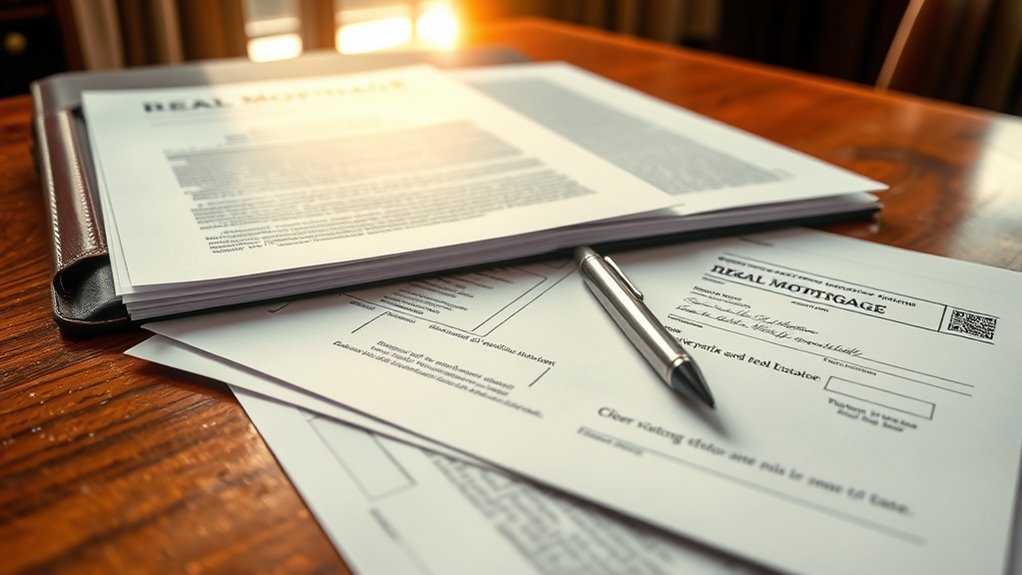To file and access mortgage and real estate documents, you should keep copies of your title deed, appraisal reports, and related records organized and secure. Obtain these documents from local government offices, your lender, or your attorney. Proper storage guarantees you can access them quickly when needed, preventing delays in transactions or disputes. Maintaining clear, organized files helps you stay confident and prepared; there’s more to discover about managing these essential documents effectively.
Key Takeaways
- Obtain copies of title deeds and appraisal reports from local government offices, lenders, or title companies proactively.
- Keep all documents organized and securely stored for quick access during transactions or disputes.
- Record any liens, restrictions, or encumbrances noted on the title deed to ensure clear ownership rights.
- Review and verify the accuracy of appraisal reports to understand property value and terms of financing.
- Maintain and update document records regularly to ensure legal and financial clarity throughout property ownership.

Exploring the world of mortgage and real estate documents can seem overwhelming, but understanding these crucial papers is essential when buying or refinancing a property. One of the most important documents you’ll encounter is the title deed. This legal paper proves your ownership of the property and details any restrictions, liens, or encumbrances associated with it. When you’re purchasing a home, reviewing the title deed ensures there are no surprises, like existing debts or claims, that could affect your ownership rights. After the transaction, the title deed is usually recorded with local government offices, making your ownership official and publicly accessible. Keeping a secure copy of this document is vital because it serves as proof of your property rights and can be needed for future transactions or legal matters.
Understanding your title deed is essential for proof of ownership and future transactions.
Another critical step in the process is the property appraisal. Lenders typically require an appraisal to determine the fair market value of the property you’re buying or refinancing. This appraisal report provides an unbiased estimate of the property’s worth, based on its condition, location, size, and comparable sales nearby. The appraisal helps lenders assess the risk involved in financing your loan and ensures you’re not overpaying for the property. As a borrower, you should review the appraisal report carefully; it gives you insight into the property’s value, which can influence your negotiations or loan terms. If the appraisal comes in lower than the agreed purchase price, you may need to renegotiate or provide additional funds to cover the difference.
Storing these documents securely and knowing how to access them is equally important, especially since proper document management can prevent delays or complications during future transactions. Accessing these documents is usually straightforward but requires some effort. For the title deed, you can request copies from your county recorder’s office, title company, or your attorney. These entities maintain public records of property ownership. For the property appraisal, your lender typically provides you with a copy once the appraisal is completed. If you want to review it beforehand, you can ask your lender or the appraisal company directly. It’s important to keep these documents organized and stored securely, as they may be needed for future sales, refinancing, or resolving disputes.
Understanding how to file and access key documents like the title deed and property appraisal empowers you to navigate real estate transactions confidently. These papers aren’t just formalities; they are the foundation of your property rights and financial decisions. By staying informed and proactive in managing these documents, you ensure a smoother process from the initial offer to closing and beyond.
Frequently Asked Questions
How Long Does It Take to Process a Mortgage Document?
Processing a mortgage document usually takes between a few days to a few weeks, depending on factors like document security measures and record preservation protocols. You can speed up the process by submitting complete, accurate information. Once processed, your mortgage is securely recorded, ensuring your document’s integrity and long-term preservation. Keep in mind that delays may occur if additional verification or security checks are needed.
Can I Access My Mortgage Records Online Anytime?
They say, “Knowledge is power,” and with digital access, you have the power to view your mortgage records anytime. Yes, you can access your mortgage documents online through your lender’s secure portal. Just keep in mind, document security is essential—ensure you’re using strong passwords and trusted networks. This way, you stay informed while safeguarding your sensitive information, making it easier to manage your mortgage at your convenience.
What Should I Do if I Lose My Mortgage Documents?
If you lose your mortgage documents, don’t panic. Contact your lender or mortgage servicer to request copies, ensuring you address document security and privacy concerns. They can verify your identity and provide replacements securely. To prevent future issues, store copies in a safe, private location and consider digital backups with strong security measures. Regularly reviewing your records helps maintain document security and keeps your privacy protected.
Are There Fees for Retrieving Archived Real Estate Files?
Yes, there are usually retrieval fees for accessing archived records. When you request your real estate files, the agency or institution may charge a fee to cover the cost of fetching the archived records. The amount varies depending on the organization and the complexity of the request. It’s best to check with the specific office beforehand to understand any potential retrieval fees and ensure you’re prepared.
How Often Are Mortgage Records Updated or Revised?
Mortgage records are typically updated or revised whenever there’s a change in the loan details, such as payments, interest rates, or property information. The record update frequency depends on the revision process, which can be triggered by scheduled audits or new transactions. You should check with the relevant agency or lender, as they may update records periodically or upon specific events, ensuring your information stays current and accurate.
Conclusion
Keeping your mortgage and real estate documents organized is like tending a garden—you’ll reap the benefits of easy access and peace of mind. By filing and accessing your papers properly, you’re planting seeds for smoother transactions and future reference. Think of your documents as a sturdy bridge connecting you to your property’s history. Stay diligent, stay organized, and watch your real estate journey flourish with confidence and clarity.









